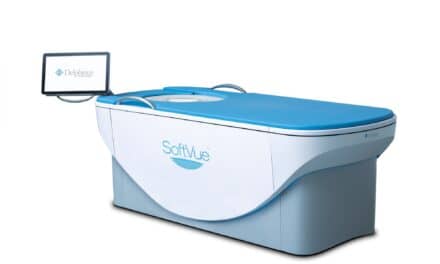Delaware Imaging Network, a division of RadNet Inc, announces that it has started implementation of its new Enhanced Breast Cancer Detection (EBCD) service, which works in concert with a patient’s annual breast screening regimen.
For an additional fee, patients can receive an advanced screening mammography offering including (i) the application of Saige-Dx, an FDA-cleared artificial intelligence (AI) technology powered by DeepHealth; (ii) an additional AI-driven review (“Accord”) applied to certain suspicious exams and findings; (iii) an in-depth, personalized lifetime risk assessment for breast cancer; and (iv) a dedicated 1-800 support line for questions about certain aspects of the patient’s reports. EBCD presents a significantly improved level of accuracy in breast cancer detection, empowering women to take greater control of their health.
RadNet is a global leader in the development and use of AI for cancer screening, and the use of AI is significantly featured in the Enhanced Breast Cancer Detection service.
“AI is dramatically improving our detection capability and overall quality,” said Howard Berger, M.D., President and Chief Executive Officer of RadNet. Gregory Sorensen, MD, founder of DeepHealth and President of RadNet’s AI division, added, “Saige-Dx is a sophisticated, AI deep-learning algorithm that has been trained on more data than any one radiologist would see in a lifetime. Saige-Dx’s pivotal study showed that radiologists who used Saige-Dx improved their performance, something no other mammography AI tool has demonstrated. Saige-Dx analyzes each mammogram in detail, and if suspicious findings are present, the AI identifies the lesion in the exam for the radiologist and categorizes the level of suspicion.”
Jacqueline Holt, MD, Director of Breast Imaging at Delaware Imaging Network, stated, “In medicine, the ability to see and detect disease with more certainty is a game-changer, driving better patient outcomes. We are using AI to detect breast cancers that the human eye might not notice. In my experience, the addition of these proven, FDA-cleared algorithms has allowed us to detect hundreds of cancers that otherwise would not have been found at the time of screening.”
In the past, many breast screening mammography patients have described a desire for more information about the reports and follow-ups they receive after their annual mammogram, including their lifetime risk of developing breast cancer. While a breast density score, currently required in 38 states, is one factor in a patient’s lifetime risk for breast cancer, multiple factors can increase risk. The EBCD service offers a much-needed solution that addresses questions about breast cancer risk by providing a personalized report and a specialist to call when patients have questions about their lifetime risk of breast cancer. Depending on the patient’s risk level, their referring physician might recommend a customized screening protocol.
The EBCD service was created for women who want more accurate and informative mammograms. According to Dr. Berger, “The EBCD service is one of the most exciting and important endeavors the Company has pursued for our patients and staff. It serves as another example of how RadNet continues to lead radiology forward.”
[Source(s): RadNet, PRNewswire]






